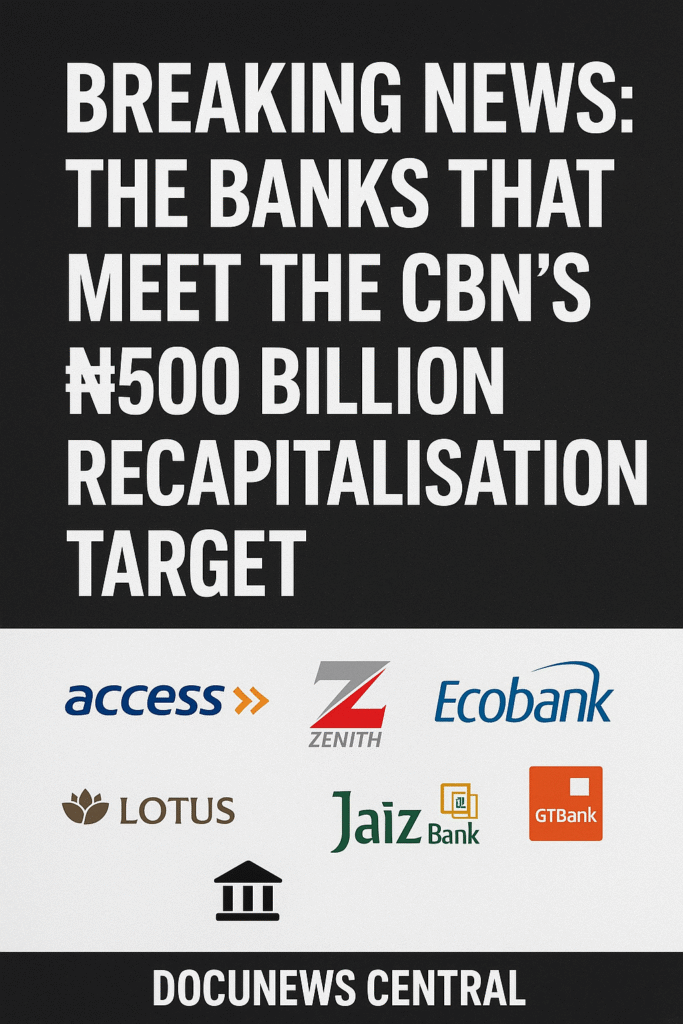
BREAKING NEWS: The Banks That Meet the CBN’s ₦500 Billion Recapitalisation Target
By DocuNews Central
Abuja | September 2, 2025
Lead Story
The race to meet the Central Bank of Nigeria’s recapitalisation target has now reached a turning point. The apex bank, led by Governor Olayemi Cardoso, has confirmed that eight commercial banks have already met the ₦500 billion capital requirement for banks with international authorisation.
At the same time, strong reports from respected media platforms suggest the number may have risen to nine or even ten as fresh capital raises are being announced. One of the latest additions is GTBank, which injected new funds in late August to cross the threshold.
This is one of the most important financial developments in Nigeria in recent times. The ₦500 billion recapitalisation drive is not just about banks meeting figures. It is about building a stronger, safer, and more resilient financial system that can support businesses, protect customers, and boost investor confidence.
DocuNews Central has gone deep into the facts to bring you the full story — and the names of the banks that have made it. Read to the end to see the full list.
Why the Recapitalisation Rule Matters
Nigeria’s banking sector has seen many reforms, but the 2024 recapitalisation directive is one of the biggest. The CBN announced in April 2024 that all banks must meet new minimum capital requirements before March 31, 2026.
The requirements are:
₦500 billion for commercial banks with international authorisation.
₦200 billion for national banks.
₦50 billion for regional banks.
For international banks, which serve not just Nigeria but other countries, the ₦500 billion requirement is the highest ever in the country’s history.
The aim is simple: to make sure Nigeria’s banks are strong enough to handle shocks. The CBN wants them to be able to fund big infrastructure projects, support industries, and absorb risks from global financial instability.
When a bank is undercapitalised, it is more likely to collapse during crises. That collapse hurts ordinary Nigerians the most — the depositors who keep their salaries there, the small businesses that rely on loans, and the investors who trust the system.
This is why the recapitalisation push is not just about figures. It is about protecting people, businesses, and the wider economy.
The CBN’s Official Position
The strongest confirmation came on July 22, 2025, when Governor Olayemi Cardoso addressed journalists after the Monetary Policy Committee meeting.
He said clearly:
“Eight commercial banks have successfully met the recapitalisation requirement ahead of the March 2026 deadline.”
This statement is the official position of the CBN. At that moment, eight banks had been verified by the regulator as compliant. This was a major boost for confidence, showing that the sector was moving in the right direction.
Media Reports Suggest Higher Numbers
Even though the CBN has publicly confirmed eight, several media reports suggest that the real number is now higher. This is because some banks continued to raise money after the July announcement.
TVC News reported in early July that five banks had already crossed the ₦500 billion mark: Access Bank, Zenith Bank, Ecobank Nigeria, Lotus Bank, and Jaiz Bank.
BusinessDay and The Nation later reported the CBN’s figure of eight banks.
Legit.ng confirmed in late August that GTBank raised ₦365.85 billion through a fresh issue, bringing its capital to ₦504.04 billion. This addition meant at least nine banks had crossed the line.
This is why some headlines now say nine or even ten banks have met the recapitalisation rule.
The Banks That Have Met the ₦500 Billion Requirement
From the CBN’s confirmation and media tracking, the following banks have either been officially named or strongly reported to have met the ₦500 billion requirement:
- Access Bank – Raised ₦351 billion in a rights issue, pushing its total to about ₦600 billion.
- Zenith Bank – Raised ₦350.4 billion, bringing its capital to ₦614.65 billion.
- Ecobank Nigeria – Reported by multiple outlets to have crossed the threshold.
- Lotus Bank – A non-interest bank that is now counted among compliant banks.
- Jaiz Bank – Another non-interest bank that has successfully reached the ₦500 billion target.
- GTBank – The latest to join after its ₦365.85 billion raise in August, which took it to ₦504.04 billion.
- Two unnamed banks – The CBN confirmed there are eight banks, meaning there are two others whose names have not been made public.
This makes eight officially confirmed by the CBN, and at least nine according to the latest media reports.
Why the Numbers Differ
There is often a difference between the number confirmed by the CBN and the number reported in the news. This happens because of:
Timing: The CBN’s figure reflects the situation at the time of its July announcement. Banks like GTBank added new capital later, so they were not included then.
Verification: Media outlets often report compliance once a bank announces a successful capital raise. The CBN, however, will only include a bank after full review and verification.
That is why the CBN still says eight, while media counts point to nine or ten.
The Road to the Deadline
The deadline for recapitalisation is March 31, 2026. This means that banks that are yet to meet the requirement still have time — but the pressure is on.
Between now and then, we should expect to see more:
Rights issues – where banks sell new shares to existing shareholders.
Private placements – where wealthy investors inject funds.
Mergers and acquisitions – where weaker banks join forces with stronger ones.
The banking sector could look very different by the time the deadline passes.
Lessons from 2005 Consolidation
The 2005 consolidation under then CBN Governor Charles Soludo is still fresh in memory. Back then, banks were asked to raise their capital base to ₦25 billion. Many could not do it alone. The result was a wave of mergers and acquisitions that reduced the number of banks from 89 to 25.
Today, the target is twenty times higher — ₦500 billion. The impact will likely be even bigger. Some banks will shine. Others may vanish into mergers.
The common point is that the system will be left with fewer but stronger banks.
Why Nigerians Should Pay Attention
This recapitalisation drive touches everyone in Nigeria.
Customers: If your bank is on the list of those that have met the requirement, your money is safer.
Investors: A stronger banking system builds confidence and attracts foreign investment.
Businesses: Bigger banks mean more capacity to give loans for projects, agriculture, and industry.
The Economy: Strong banks help the country withstand global economic shocks.
This is why the recapitalisation journey is more than just a financial story. It is a national issue that affects jobs, businesses, and growth.
So, Who Has Made It?
As promised, here is the list of banks that have met the ₦500 billion recapitalisation requirement so far:
✅ Access Bank
✅ Zenith Bank
✅ Ecobank Nigeria
✅ Lotus Bank
✅ Jaiz Bank
✅ GTBank
✅ Two more unnamed banks confirmed by CBN
That makes eight officially recognised by the CBN, and at least nine according to late August reports.
Closing Word
Nigeria’s banking sector is at a turning point. The ₦500 billion recapitalisation rule is reshaping the industry. Already, eight banks are confirmed by the CBN as compliant. Media reports say nine or ten have made it. More will surely join in the months ahead.
By March 2026, the banking landscape will look very different. Some banks will emerge stronger than ever. Others may vanish through mergers.
What matters most is that Nigerians will be left with a financial system that is stronger, safer, and better prepared for the future.
DocuNews Central will continue to follow this story closely, bank by bank, figure by figure. Stay with us for every update.
DocuNews Central — Your trusted source for truth, clarity, and news that matters.










The two unnamed banks confirmed by the CBN; are the fictitious banks.
We need a completely relevant and precise information on the happenings in the economy.
Thank you for that we do appreciate you for that information thanks and God bless
Thanks for the update
What of First Bank of Nigeria and UBA. What will happen to customers whose banks did not the target. Will their money be refunded or how.